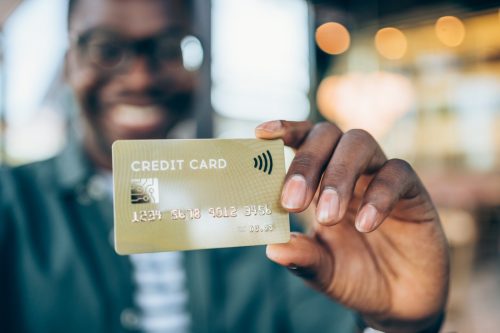Never Buy Anything Online With This Kind of Card, FBI Warns

However much you’ve already shopped online this year, you might find your habits accelerating in the coming months. Whether you’re ordering last-minute Halloween costumes from Amazon, cashing in on Cyber Monday deals, or buying Christmas gifts, the online shopping season is bound to be busy. But even if this is a normal yearly occurrence for you, you might be making some risky mistakes. The Federal Bureau of Investigations (FBI) is alerting Americans to a common error that many people make. Read on to find out what kind of card you should never use when shopping online.
READ THIS NEXT: Never Do This With Your Phone in Public, FBI Warns.
The FBI has been cautioning Americans about online shopping scams.

Given the many dangers lurking online, the FBI has an entire section of its website dedicated to keeping Americans safe online. “Everyday tasks—opening an email attachment, following a link in a text message, making an online purchase—can open you up to online criminals who want to harm your systems or steal from you,” the agency says.
In 2020, the FBI issued an alert warning consumers about a rise in online shopping scams. “An increasing number of victims are being directed to fraudulent websites via social media platforms and popular online search engines,” the agency said. These fake websites usually result in consumers falling victim to one of the most prevalent online shopping schemes: the non-delivery scam.
“In a non-delivery scam, a buyer pays for goods or services they find online, but those items are never received,” the FBI explains.
Consumers are losing more money to online shopping scams every year.

According to a Feb. 2022 report from the Federal Trade Commission (FTC), consumers lost more than $5.8 billion to fraud in 2021, which was a 70 percent jump from the year before. Following imposter scams, online shopping scams were responsible for a majority of the losses. The agency’s report showed that consumers reported a total of around $392 million in losses through online shopping fraud last year—a significant increase from the $246 million losses reported from this type of scam in 2020.
And there does appear to be an increase in online shopping scams during the fall and winter holidays, according to the FBI. The agency says that its Internet Crime Complaint Center (IC3) usually receives a large number of complaints in the early months of each year, “suggesting a correlation with the previous holiday season’s shopping scams.” At the same time, the FBI is quick to note that online shopping theft can happen at any time of the year.
For more safety advice delivered straight to your inbox, sign up for our daily newsletter.
The FBI advises shoppers not to use one type of card when buying online.

Despite their prevalence, online shopping scams are not inevitable—so there’s no need to give up online shopping entirely. Instead, the FBI has one major piece of advice for e-commerce consumers: don’t use your debit card. “Make online purchases with a credit card for an extra layer of protection against fraud,” the agency recommends.
One of the main reasons the FBI advises against using your debit card to make purchases online is because it doesn’t always guarantee the same protection for victims of online shopping scams. According to Bankrate, credit cards are protected under the Fair Credit Billing Act (FBCA), but debit cards are not.
If you don’t end up receiving what you paid for, the FBCA allows you to dispute the charge on your credit card as a billing error, the FTC explains. On the other hand, the agency warns that only “some debit card issuers may voluntarily offer protections,” as they are not required to do so.
“If you paid by debit card, the consumer protections are different than they are for credit cards,” the FTC says. “You may not be able to get a refund for non-delivery.”
You should be keeping close track of your online purchases.

When you buy something online, the FBI recommends that you “always get tracking numbers” for your items—even if you paid by a credit card. This allows you to make sure your order has been shipped and lets you follow the delivery process. If you never received what you bought online, the FTC says you should “notify the seller as soon as possible.”
Under the federal Mail, Internet, or Telephone Order Merchandise Rule, a seller has to ship your order within the time it says it will. “If the seller doesn’t promise a time, it has to ship your order within 30 days of when you place it,” the FTC says. If your order cannot be shipped within the promised time, the seller must notify you about any delays. They must also give you a new shipping date and give you the chance to cancel your order for a full refund.
“If you have a problem when you shop online, try to work it out directly with the seller or site owner,” the FTC recommends. If that doesn’t work, you should contact your credit card company to dispute the charge and report online shopping scams to the FTC.